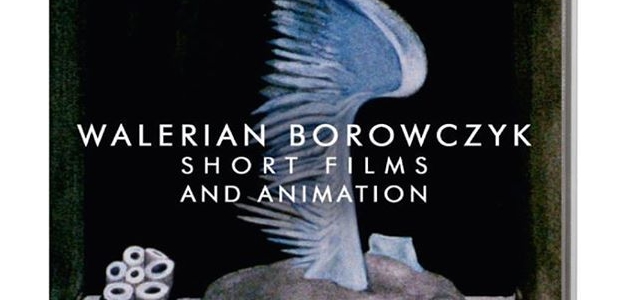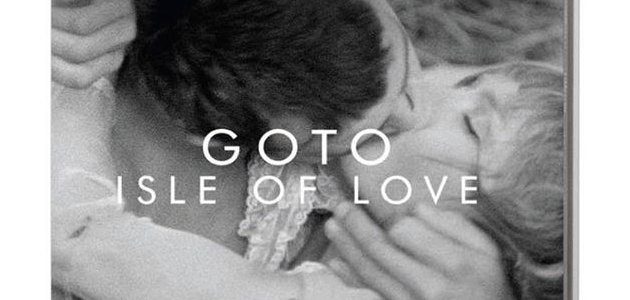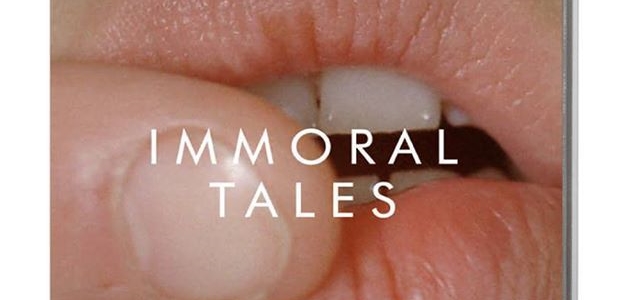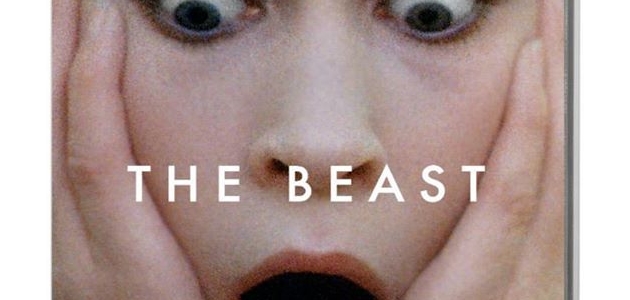Now On Blu-ray: CAMERA OBSCURA: THE WALERIAN BOROWCZYK COLLECTION Is A Stunner
We were fortunate to be granted a look at the entire set, and are excited to finally present our thoughts on this remarkable collection,. my vote for the best home video release of 2014.
One thing I don't go into in the gallery below, and I'd be remiss for neglecting, is the massive 300 page book of Borowczyk's own writing and artwork and critical essays about his films. It's an impressive piece of work that would be worth purchasing on its own (you can see pictures of it here). Some 89 pages of his short stories and 251 pages of scholarly writing add up to an essential collection that deserves its own release. I must commend the team behind this release, starting with Daniel Bird and Michael Brooke, for creating a monster of a box set for a criminally underappreciated artist.





Born in 1923, just as Europe was beginning to rebuild after World War I, the first projects by Walerian Borowczyk (aka Boro) were animated pieces of avant-garde ephemera. An artist and artisan by training, a set of skills he would use often and to great effect throughout his career, animation seems like it was the logical choice for this creative visual artist to put his ideas on screen when live-action just wasn't able to do it.
This set provides a look at a few of Boro's most famous shorts and animations and the influences and influential nature of the films becomes immediately clear. Films like Boro's collaborative work with Chris Marker (La jetee), Les Astronauts show how ahead of his time and yet rooted in the contemporary art scene he was. The film, which Marker contends was largely Boro's work, showcases the kind of cut-and-paste animation that would later become so indicative of the early work of Monty Python's Terry Gilliam.
Boro's work as the artisan on these films is, perhaps, never more evident than in my personal favorite of this collection, The Phonograph. This six minute stop-motion animation made in 1969, around the same time as his live-action feature debut Goto, very beautifully illustrates Boro's interest and recurring passion for degradation and the way things fall apart. Many of his films either center around, or hint at this interest in the disintegration of either physical objects, cultures, relationships, or people. With The Phonograph, we get to see a world destroyed being put back together, but the focus is clearly not on the final product, but on the manner in which it was destroyed in the first place. Brilliant stuff.
Also included, and rightly so, is Boro's animated first feature, Theatre of Mr. and Mrs. Kabal, an extension of one of his shorts featuring a mismatched couple. Mr. Kabal is a short square man with a penchant for voyeurism and Mrs. Kabal an Amazonian woman who loves him very much. The film moves fluidly between live action and animation, and while it's decidedly artsy, it is entertaining in its embrace of the grotesqueries of its characters.
The Disc:
All of these films have been restored and are presented in astonishingly clear and colorful (when appropriate) HD. I can't imagine having to suffer through them any other way, now, knowing how amazing they can look. Included among the extensive extras are a documentary about Boro's animated work, and introduction by Terry Gilliam who clearly owes a lot to Boro, as well as other visual essays and related interviews.
To be honest, the extra content across this whole set is exceptional, and I know I'm going to end up giving short shrift to the people who created it. It appears that the producers of the disc have taken great pains to contact every living contributor of Boro's for an interview, and the results are an unprecedented look into the work of an artist who, more than most, appears to be entirely represented by his work on screen. Hearing the stories on this and other discs paints a picture of a man obsessed with detail, largely disinterested in delegation, and intensely proud of his art.
Goto Isle of Love is Walerian Borowczyk's much lauded debut live-action feature film. Goto announced to the world, then as now less interested in short films than features, the arrival of a new and unique talent. The story, again, centers around the unfaithful wife of a lord and the means to which everyone around her will go to secure her as a possession. This black and white feature shows Borowczyk in complete control of the elements that make a film memorable, and the result is a film that could have been made by no one else.
The titular island of Goto is an isolated place in which a dictator, Goto III, controls everything that goes on around him. The film and its treatment of despotic communism and the brain-washing that comes with stunned audiences to attention in the 60's and marked Boro's succesful transition from a maker of odd little short films to a feature director able to harness the energy and will he put into those shorts and make it stand up over 94 minutes.
The disc, again, is beautiful. There is next to no visible damage and this film, which was the focus of the initial crowdfunding campaign that ultimately led to the set, looks outstanding. The extras, including even more of Boro's admirers (like Turner Prize nominee Craigie Horsfield), contemporaries, and co-conspirators are worth the price of admission alone. The attention to detail that marked his short films like The Phonograph shows up in spades here, as the isolated island is rife with small touches, like the iconic fly-trap, made by Boro himself and not some set dresser or propmaster.
Boro's flair for the Shakespearean dramatic is in ample supply in Goto, as it was in Blanche and many of his other features. Wanton wives, jealous husbands, and love struck men of a lower station are stock characters in Boro's world. As he explores the same themes throughout his early career, his ability to elaborate upon those themes grows more and more solid. Goto may not be his masterpiece, but everything else in this set points back to Goto, and there's nothing else like it anywhere.
Boro's first feature length color film, Blanche is an adaptation of Polish play, Mazeka, by author Juliusz Slowacki. In it, the young wife of an elderly feudal lord is the target of amorous proposals from every man she encounters, much to the chagrin of her husband. When she returns the affection of a visiting king's page, all hell breaks loose as the two lords attempt to clean up the mess.
Blanche is an auteur's film. Admittedly and explicitly owing its visual styling to medieval painting and fresco work, Boro turns the film into a tableaux of images like those that adorn the kind of 18th century castle in which the film takes place than a modern film. The camera is usually static, with very few dolly or moving shots, and the action of the film moves through the frame, like watching a play through a window. We see what Boro wants us to see, and it's not always what we expect or wish to see. Feet and legs pass through frames as important dialogue is spoken, action moves off screen in crucial parts of the narrative, and we are often left to imagine the faces of the participants as they suffer the indignities of passion.
Boro's bold stylistic choices are rarely more on display than they are with Blanche. The film doesn't always flow particularly well, but each and every editorial and cinematographical choice appears exactly as he'd imagined it. We often say about beautiful films that each frame is a work of art on its own, but with Blanche, it's actually so. There isn't a clumsily composed shot in the film, Boro's mastery of mise-en-scene is impressive and infuriating all at once.
The action is quite deliberately paced, and the settings, though perfectly art-directed, are quite unnattractive. Blanche is perhaps not the best jumping off point for neophytes to Borowczyk's work as it doesn't create a lot of momentum to seek out more, but it is, along with Goto, perhaps the most indicative of his style and aesthetics. If you get impatient easily while watching movies, this probably isn't for you, but patience is a virtue rewarded in spades.
The Disc:
Again, the HD restoration is as beautiful as one could possibly expect. Blanche is rather bland in its overall color palette, but it appears to be represented quite faithfully on this disc. The film still suffers from the occasional speckle of dust or print damage, but nothing that interferes with the viewing experience. The audio is similarly clean, with Borowczyk's choice of period music played on period instruments paying off with a unique aural experience.
More extensive extras come along with Blanche. A documentary titled Ballad of Imprisonment accompanies the feature and it is hugely informative and interesting as a look at Boro's working style. Also included is a 1985 interview with the man, himself, toward the end of his career as he looks back on his body of work. Every bit of footage of Boro or his collaborators just cements his place as one of the great film auteurs. What a wonderful presentation.
Immoral Tales, as far as I know, is the only film in this set to have previously existed on Blu-ray. The German disc from Bildstorung, however, is not English friendly, so that makes Arrow's disc a treat for those of us limited to one tongue.
While Boro's most notorious film is probably The Beast, that film's shock value has nothing on Immoral Tales. This film, an episodic erotic adventure through the ages, is insistent on letting its audience know that however kinky or disturbed you think people are these days, there was always someone there before you. Borowczyk tackles incest, religious fetishism, historical blood play, and more in the film in ways that surely upset everyone possible.
Running through synopses of the chapters is not an entertaining way to discuss the film; the power is in the images. Once again, Boro goes for the static camera, which effectively turns the viewer into an objective participant. The challenge, then, is on us to keep watching. One immoral kink after another to push the viewer away, but instead the film draws you in, humanizing the characters and almost inspiring empathy at points. Of course there are the historical monsters, Erzebet Bathory and the Borgias, whose stories are well documented, and lovingly recreated in immaculate detail by Boro in the later chapters of the film.
Boro's emotionally distant and detached camera is never more evident that in these films. They are like moving versions of the frescoes he so often references in his work. We observe, but don't interact, which makes the film feel like an anthropological artifact as much as anything. While Immoral Tales is engaging to those in the proper mood, its emotional detachment and lack of plot make it the least of these films, in my opinion, but that's only slight condemnation, given the quality of the films included.
Again, Michael Brooke and Daniel Bird, who took this project and ran with it, provide us with an embarrassment of riches in terms of extra material. Most interesting among the bunch are the original episodic version of Immoral Tales, and the Boro documentary A Private Collection. However, we also get yet another documentary on the making of the film with many faces which have become familiar by now as collaborators, and a Boro Brunch, in which many of the talking heads from this set come together to share recollections. This disc has my favorite set of extras of any of the discs in this outstanding set.
Much as been written about The Beast, and most of it far more eloquent than I could ever hope to be, but I'm obliged to throw in my two cents, and so I shall. The Beast is certainly Walerian Borowczyk's most notorious film, just as Possession is Anderzej Zulawski's most notorious film. To put it bluntly, it will always be the film about a woman fucking Bigfoot. Of course there's more to it than that, but those few frames in the film will always dominate the conversation, and they should, it is the climax after all, pun intended. But The Beast has more to offer, even if the rest of the story pales in outrage to that scene.
The Beast is the story of a once noble family in steep decline. A family curse has kept them isolated and their scion a bachelor years beyond his prime. When a family with more to offer makes a deal to marry and join the families in a political union, the offer is gratefully accepted and the race to hide the ugly truth as long as necessary begins.
This is yet another of Boro's class satires, and while it is perhaps the most densely plotted of his features up until this time, it's also arguably the most entertaining, even before the titular Beast appears. It's worth noticing that Boro foreshadows everything that happens in the film, and challenges the audience many times before the climax. The horse husbandry sequence, which enthralls our heroine and was included as a slap in the face to the mechanical nature of hardcore pornography of the day, will likely repulse many viewers. Boro knows this, and returns to these images several times. A lovemaking scene between the family's young daughter and a servant seems innocent enough until it becomes apparent that there were two small children hiding in a wardrobe the entire time. All of these and more are flashed before us in preparation for the coup de grace, which, in comparison, is only slightly more outre than the rest. However, since that sequence is typically the focal point of discussion, it is usually taken out of context and looks all the more outrageous for it.
I enjoy The Beast. For all of its pretension and social commentary, the film is just batshit crazy, and that's what makes me love it even more. Boro manages to retain his typical staid tone throughout this comical insanity and his straight face only makes me laugh harder. As I said, deep critical readings of the sexual and social politics of The Beast abound, but my take on the whole thing is that it's just a lot of raunchy, intelligent fun.
The extras continue with another Boro short, Venus on the Half-Shell, and yet another making-of documentary. Add to this a visual treatment of Boro's proposed but unrealized sequel, and you've got a pretty definitive look at The Beast. The only things missing here are the alternate cuts provided in Cult Epics' three disc limited edition, but even if you already have that (as I do), you'll probably never watch it again after seeing just how beautiful the film looks in this beautifully restored HD edition.

More about The Beast
- Akira Kurosawa's SEVEN SAMURAI Gets a 4K Upgrade From Criterion
- ScreenAnarchy's Top 10 Films Of The First Half Of 2024
- Now Streaming: Bertrand Bonello's Cinematic House of Pleasures
- THE BEAST Review: Lovers Beset By a Sense of Doom
- New York 2023 Review: THE BEAST, Hefty Ideas Swirl Around, Stylized to Perfection
More about Camera Obscura: The Walerian Borowczyk Collection
Around the Internet
Recent Posts
Friday One Sheet: LIVING THE LAND
Now Playing: BLADES OF THE GUARDIANS and Some Other Movies
Leading Voices in Global Cinema
- Peter Martin, Dallas, Texas
- Managing Editor
- Andrew Mack, Toronto, Canada
- Editor, News
- Ard Vijn, Rotterdam, The Netherlands
- Editor, Europe
- Benjamin Umstead, Los Angeles, California
- Editor, U.S.
- J Hurtado, Dallas, Texas
- Editor, U.S.
- James Marsh, Hong Kong, China
- Editor, Asia
- Michele "Izzy" Galgana, New England
- Editor, U.S.
- Ryland Aldrich, Los Angeles, California
- Editor, Festivals
- Shelagh Rowan-Legg
- Editor, Canada











